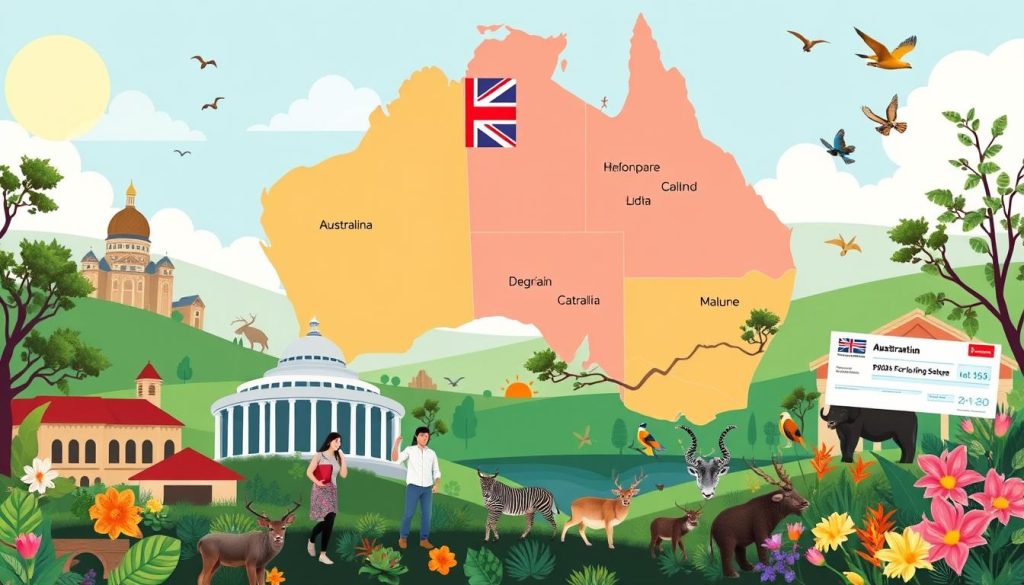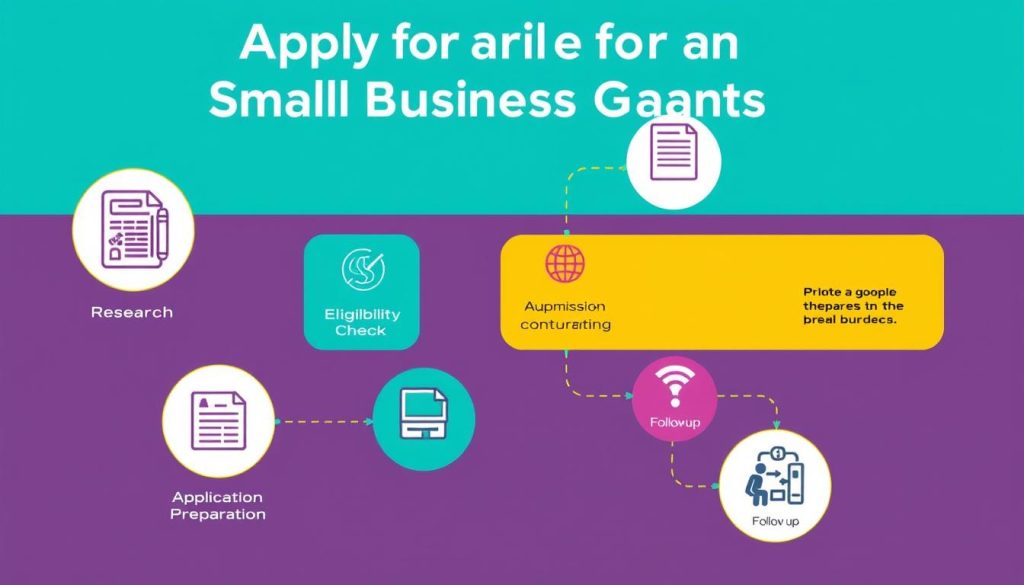In 2025, the world of small businesses in Australia is changing fast. Getting financial help is more important than ever. Small business grants in Australia are key, helping businesses to grow and succeed.
This article is your guide to the top grants in 2025. It covers who can apply, how to apply, and tips for success. Knowing your options is crucial for small business owners to make the most of these chances.
Introduction to Small Business Grants in Australia

Small business grants in Australia are key financial aids for entrepreneurs. They help boost local economies. These grants are crucial for businesses looking to start or grow.
Grants do more than just provide money. They help small businesses grow and stay strong. This means owners can invest in new tech, hire more staff, or improve marketing.
Knowing about the different grants helps business owners find the right funding. Governments offer many grants for various business needs. Using these resources can help businesses reach their goals.
The Importance of Grants for Small Businesses

Grants are crucial for small businesses in Australia. They help entrepreneurs with new ideas, technology, and growth without debt. These funds also boost the local economy.
Grants help create jobs and increase competition. They allow owners to focus on growth and sustainability. A strong small business sector means more variety for consumers.
Grants also help businesses with limited resources. They encourage teamwork and knowledge sharing. This makes the economy stronger and benefits everyone.
Best Small Business Grants in Australia

Exploring small business grants can unlock new opportunities for entrepreneurs. In 2025, many funding options will be available for small businesses in Australia. These include grants from both federal and state governments, as well as those specific to certain industries. It’s vital for businesses to understand the grants available to them.
Overview of Available Options
In 2025, a wide range of top small business grants will be available. Some notable options include:
- Federal government grants for innovation and technology
- State grants for regional development
- Grants for specific industries like tourism and agriculture
- Grants for environmentally sustainable practices
Each grant is designed to support different business needs. This means entrepreneurs can find financial help that matches their goals.
Eligibility Criteria
Knowing what makes you eligible for grants is key for small business owners. Most grants have similar criteria, such as:
- Business size, based on employee numbers or revenue
- Location, focusing on specific regions
- Project type, aligning with the grant’s purpose
Understanding these criteria can greatly improve your chances of getting grants. Being well-prepared and knowing what’s needed can help make your application stand out.
Federal Government Grants

Small businesses can really benefit from federal grants in Australia. It’s important to know about the main programmes and initiatives. These help support small businesses, making them more innovative and competitive.
Key Programmes and Initiatives
There are several key initiatives for small businesses. These include:
- Research and Development Tax Incentive: This programme helps businesses innovate by offering tax offsets for R&D activities.
- Export Market Development Grant: This grant helps small businesses enter or grow in international markets. It covers marketing expenses.
- Building Better Regions Fund: This fund supports projects that create jobs, grow the economy, and build stronger communities.
Application Processes
The application process for grants can seem tough. But, knowing the steps can really help. Here’s how to apply for federal grants:
- Find grants in Australia that fit your business needs.
- Get ready your documents, like a detailed business plan and financial statements.
- Apply through the right government portal, making sure everything is complete and correct.
- Keep in touch with the funding body to answer any questions or provide more info if needed.
State Government Grants

State grants in Australia are crucial for small businesses. Each state has its own funding to meet local needs. These grants help businesses grow and innovate. Knowing what each state offers can help businesses get the funds they need.
Each State’s Unique Offerings
Different states have their own programmes. These are designed to fit their economic needs. Here are a few examples:
- Queensland: Focuses on grants aimed at boosting tourism and infrastructure projects.
- Victoria: Offers local government grants that support tech-driven initiatives and research-focused businesses.
- New South Wales: Provides funding for start-ups and businesses looking to expand into new markets.
- Western Australia: Prioritises support for industries that contribute to state resources and innovation.
How to Navigate State Resources
To get regional business funding, follow these steps:
- Research local government grants through state department websites or economic development offices.
- Participate in local business networks and community groups to share experiences and insights.
- Attend workshops and training sessions offered by state agencies to better understand grant application processes.
Grants for Specific Industries

Small businesses in certain sectors find growth and innovation easier with industry-specific grants. These grants offer support that matches the unique needs of different industries. They help businesses in tech, environmental sustainability, and the arts and culture sectors.
Tech and Innovation Grants
Tech funding in Australia is key as digital technology advances. Grants for tech and innovation help businesses create new products and services. They also improve how businesses work. The government has many programs to support research and development, helping small businesses stay ahead.
Examples include:
- The Research and Development Tax Incentive
- Accelerating Commercialisation Grant
- Digital Solutions Grant
Environmental Sustainability Grants
Grants for sustainability help businesses go green and cut carbon emissions. They fund projects on renewable energy, reducing waste, and managing resources sustainably. This support lets small businesses adopt eco-friendly practices and attract eco-conscious customers.
Notable examples include:
- The Environment and Sustainability Grants Program
- Clean Energy Innovation Fund
- Carbon Neutral Program
Arts and Culture Grants
Grants for the arts and culture sector are vital for creative businesses. They support projects in visual arts, performance, and heritage. This funding encourages collaboration and community involvement.
Key grants include:
- The Australia Council for the Arts Grants
- Regional Arts Fund
- Creative Partnerships Program
Eligibility Requirements for Small Business Grants

Understanding what makes you eligible for small business grants is key. Different grants have their own rules, but some are similar. Knowing these can really help you get the funding you need.
Common Criteria Across Grants
When it comes to small business grants, there are a few main things to know. These are often the same for many grants. Here are some of the most important ones:
- Business Structure: You usually need to be a registered business, like a sole trader, partnership, or corporation.
- Revenue Levels: Grants often have a minimum revenue requirement. This makes sure the funding goes to businesses of a certain size or stage.
- Project Goals: Your project must match the goals of the grant provider. This could be about innovation, being green, or helping the local area.
- Previous Funding History: Some grants look at your past experiences with public funding. They want to see if you can manage projects well.
- Compliance with Regulations: You must follow local laws and have the right licenses for your business.
How to Apply for Small Business Grants

Getting funding is key to growing a small business. Knowing how to apply for grants is crucial. Here’s a step-by-step guide for small business owners to apply successfully.
Step-by-Step Application Process
Following a clear process is important for a well-prepared application. The main stages are:
- Research Grants: Find grants that match your business goals and industry.
- Check Eligibility: Make sure your business meets the criteria.
- Gather Necessary Documents: Collect financial statements, business plans, and tax records.
- Develop Your Proposal: Write a clear application outlining your goals and how you’ll use the funds.
- Submit Your Application: Follow the submission guidelines carefully, ensuring all documents are correct.
- Follow-Up: After submitting, consider contacting the grant body for updates.
Tips for a Successful Application
Using successful grant application tips can improve your proposal. Keep these points in mind:
- Be Clear and Concise: Clearly state your business goals and the funding’s impact.
- Demonstrate Need: Explain how the grant will solve specific challenges or opportunities.
- Show Experience: Share past successes and relevant experience to build credibility.
- Engage Stakeholders: Involve team members or mentors for valuable insights and feedback.
- Tailor Your Application: Customize your application for each grant opportunity.
Financial Management Tips for Grant Recipients

Managing grant funds well is key for small businesses. It helps them get the most out of financial support. Good budgeting for grants is vital for project success. This section shares important tips for keeping finances stable and clear.
Budgeting Your Grant Funds
Starting with a detailed budget is essential for financial management. A good budget helps in spending wisely and prevents overspending. Here are some steps to follow:
- Define clear financial goals related to grant activities.
- Break down the budget into specific categories such as personnel, equipment, and operational costs.
- Set aside a contingency fund to handle unexpected expenses.
- Regularly review and adjust the budget as necessary to accommodate changing circumstances.
Tracking Expenses Effectively
Keeping track of expenses is crucial for managing grant funds. It ensures you follow grant rules. Use these methods to stay accurate:
- Utilise software tools designed for tracking finances, making it easier to monitor expenditures.
- Keep all receipts and invoices related to grant spending for transparency.
- Establish a timetable for regular financial reviews to assess budget adherence and overall spending.
- Communicate with grant managers if discrepancies arise, fostering a cooperative relationship with funders.
Challenges in Obtaining Grants

Getting grants can be tough for small business owners. It’s important to know the hurdles. Entrepreneurs often find the application process hard and the rules strict. Many also don’t know about all the funding options out there.
Common Pitfalls to Avoid
To succeed, it’s crucial to avoid common mistakes. Here are some to watch out for:
- Overlooking Eligibility Requirements: Make sure you meet each grant’s criteria.
- Insufficient Research: Don’t miss out on funding by not doing your homework.
- Poorly Written Proposals: Your proposal needs to be clear and engaging. A good story can help a lot.
- Not Attending Information Sessions: These sessions can give you valuable tips and advice.
- Ignoring Deadlines: Being on time is key. Stay organised to avoid last-minute stress.
By understanding these challenges and tackling them, small businesses can improve their chances. They can find the funding they need and avoid common pitfalls.
Resources and Tools for Small Business Owners

Getting the right resources can really help a small business grow. Entrepreneurs looking for grants should check out online tools and resources. These platforms give key info, like funding chances and how to apply, making it easier to find grants.
Useful Websites and Online Platforms
Many websites and online platforms help with grant applications. Here are some useful ones:
- Grants.gov – A big database for federal grants, with lots of application help.
- UK Government Grants – The official site with funding chances and resources.
- Local Enterprise Partnerships (LEPs) – Offers specific help and funding for small businesses in your area.
- The Prince’s Trust – Helps young entrepreneurs with grants and business tips.
- Angel Investment Network – Connects small businesses with investors and funding.
Using these online platforms can open doors to important funding info. It also boosts your chances of getting a grant. By tapping into these resources, you can understand the funding process better and feel more confident in your application.
Networking and Support for Grant Seekers

Networking is key for small business owners looking for grants. Making connections in your field opens up more chances and helps get the funding you need. Talking to different people can give you tips on how to apply for grants and get the most out of them.
Joining Business Associations
Business associations in Australia are full of help for those seeking grants. By joining, entrepreneurs get access to tools and events that help with grant applications. The benefits include:
- Exclusive funding info and resources
- Chances to meet experienced business people
- Mentorship to help with grant applications
- Projects that could attract grant funding
Being part of business associations creates a community and offers the support you need for grants. Together, small business owners can get more noticed and have a better shot at funding. The teamwork in these networks helps businesses grow in a lasting way.
Case Studies: Successful Grant Recipients
Looking at real-life examples of businesses that got grants can teach us a lot. Many companies in different fields have used grants to grow, improve their work, and achieve big goals. These stories show how money from grants can turn a small business into a big success.
Real-Life Examples of Impact
A tech start-up got a government grant to make new software. This money helped them work faster and hire more people. This led to a big increase in their business.
A local food producer also got financial help to grow their business. They used it to make more food and sell it to more people. This helped them sell more and reach more customers.
These stories show how grants can really help businesses. They inspire new entrepreneurs to think about how grants can help them grow. By learning from these examples, businesses can plan better and see how grants can help them succeed.
















